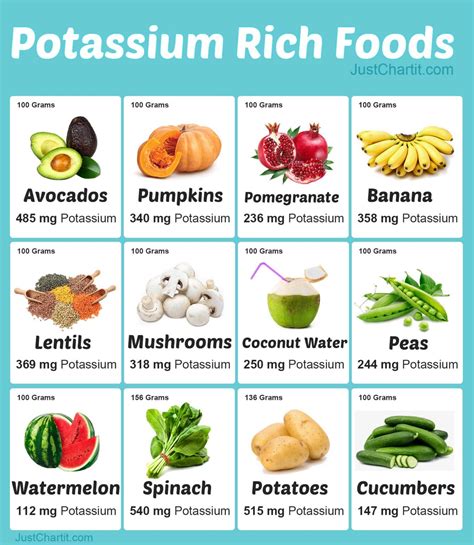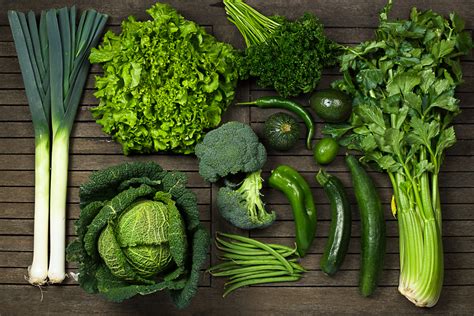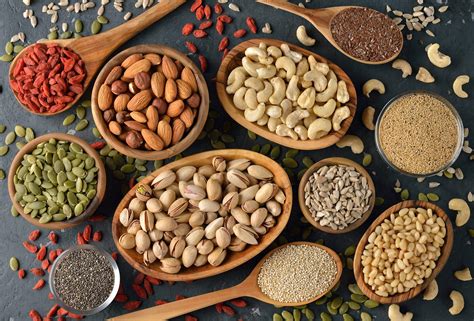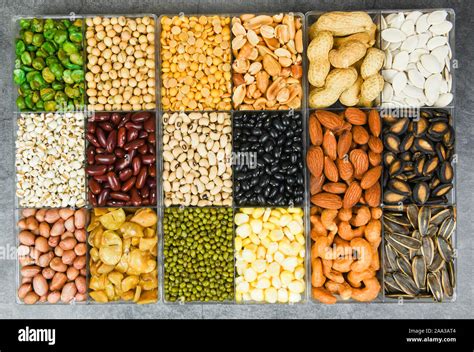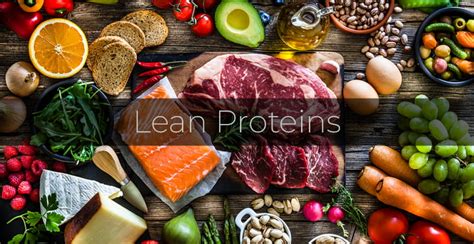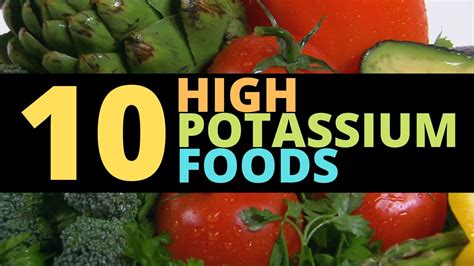Potassium is an essential mineral that plays a crucial role in maintaining various bodily functions, including heart health, blood pressure, and muscle function. It is a vital component of a balanced diet, and consuming enough potassium-rich foods can help mitigate the risk of chronic diseases. In this article, we will delve into the world of high potassium foods, exploring their benefits, types, and ways to incorporate them into your daily meals.
A diet rich in potassium can have numerous health benefits, including reducing blood pressure, promoting bone health, and supporting muscle function. Potassium helps to balance the effects of sodium in the body, which can help to lower blood pressure and reduce the risk of cardiovascular disease. Additionally, potassium is essential for maintaining healthy bones, as it helps to regulate the amount of calcium in the body. With so many delicious and nutritious high potassium foods available, it's easy to make them a part of your daily diet.
From fruits and vegetables to whole grains and lean proteins, there are numerous high potassium foods to choose from. Some of the richest sources of potassium include leafy greens, such as spinach and kale, as well as fruits like bananas and avocados. Nuts and seeds, like almonds and pumpkin seeds, are also high in potassium, making them a great snack option. By incorporating these foods into your diet, you can help to ensure that you're getting enough potassium to support overall health and well-being.
Potassium-Rich Fruits
Fruits are a delicious and convenient way to boost your potassium intake. Some of the highest potassium-rich fruits include:
* Bananas: With approximately 422 milligrams of potassium per medium-sized banana, they're a great snack option.
* Avocados: One medium-sized avocado contains around 708 milligrams of potassium, making them a nutritious addition to salads, sandwiches, and smoothies.
* Apricots: Dried or fresh, apricots are a rich source of potassium, with approximately 427 milligrams per 100 grams.
* Citrus fruits: Oranges, grapefruits, and lemons are all high in potassium, with around 236 milligrams per 100 grams.
Leafy Greens and Vegetables
Leafy greens and vegetables are some of the richest sources of potassium. Some of the highest potassium-rich options include:
* Spinach: With approximately 840 milligrams of potassium per 100 grams, spinach is a nutritious addition to salads, smoothies, and sautéed dishes.
* Kale: One cup of cooked kale contains around 900 milligrams of potassium, making it a great addition to soups, stews, and salads.
* Sweet potatoes: One medium-sized sweet potato contains approximately 542 milligrams of potassium, making them a delicious and nutritious side dish.
* Mushrooms: With around 555 milligrams of potassium per 100 grams, mushrooms are a great addition to salads, stir-fries, and sauces.
Nuts and Seeds
Nuts and seeds are a tasty and convenient way to boost your potassium intake. Some of the highest potassium-rich options include:
* Almonds: With approximately 718 milligrams of potassium per 100 grams, almonds are a great snack option.
* Pumpkin seeds: One cup of pumpkin seeds contains around 841 milligrams of potassium, making them a nutritious addition to salads, smoothies, and baked goods.
* Sunflower seeds: With around 645 milligrams of potassium per 100 grams, sunflower seeds are a great snack option or addition to salads and trail mix.
* Chia seeds: One tablespoon of chia seeds contains approximately 115 milligrams of potassium, making them a nutritious addition to smoothies, salads, and baked goods.
Whole Grains and Legumes
Whole grains and legumes are rich in potassium and other essential nutrients. Some of the highest potassium-rich options include:
* Quinoa: With approximately 563 milligrams of potassium per 100 grams, quinoa is a nutritious and filling side dish.
* Brown rice: One cup of cooked brown rice contains around 442 milligrams of potassium, making it a great alternative to white rice.
* Lentils: With around 731 milligrams of potassium per 100 grams, lentils are a nutritious addition to soups, stews, and curries.
* Black beans: One cup of cooked black beans contains approximately 611 milligrams of potassium, making them a great addition to salads, soups, and stews.
Lean Proteins and Fish
Lean proteins and fish are rich in potassium and other essential nutrients. Some of the highest potassium-rich options include:
* Salmon: With approximately 534 milligrams of potassium per 100 grams, salmon is a nutritious and delicious addition to meals.
* Tuna: One cup of cooked tuna contains around 484 milligrams of potassium, making it a great addition to salads and sandwiches.
* Chicken: With around 431 milligrams of potassium per 100 grams, chicken is a lean and nutritious protein option.
* Turkey: One cup of cooked turkey contains approximately 414 milligrams of potassium, making it a great alternative to red meat.
Incorporating High Potassium Foods into Your Diet
Incorporating high potassium foods into your diet can be easy and delicious. Here are some tips to help you get started:
* Start your day with a potassium-rich breakfast, such as oatmeal with banana and almond milk.
* Add leafy greens like spinach and kale to your salads, smoothies, and sautéed dishes.
* Snack on nuts and seeds, such as almonds and pumpkin seeds, throughout the day.
* Incorporate whole grains like quinoa and brown rice into your meals.
* Try new recipes that feature high potassium foods, such as lentil soup or grilled salmon.
Conclusion and Next Steps
In conclusion, incorporating high potassium foods into your diet can have numerous health benefits, from reducing blood pressure to promoting bone health. With so many delicious and nutritious options available, it's easy to make high potassium foods a part of your daily meals. We encourage you to start exploring the world of high potassium foods and to share your favorite recipes and tips with us. Whether you're a health enthusiast or just starting to make changes to your diet, we invite you to join the conversation and take the first step towards a healthier, happier you.
What are the symptoms of potassium deficiency?
+
Potassium deficiency, also known as hypokalemia, can cause a range of symptoms, including muscle weakness, fatigue, and heart palpitations. In severe cases, it can lead to muscle cramps, paralysis, and respiratory failure.
How much potassium do I need per day?
+
The recommended daily intake of potassium varies based on age, sex, and other factors. Generally, adults need around 4,700 milligrams of potassium per day, while pregnant women and athletes may require more.
Can I get enough potassium from supplements?
+
While potassium supplements can help fill nutritional gaps, it's generally recommended to get potassium from whole foods. Supplements can be beneficial for individuals with severe deficiencies or those who are unable to get enough potassium from their diet.
Are there any interactions between potassium and other nutrients?
+
Potassium can interact with other nutrients, such as sodium, calcium, and magnesium. It's essential to maintain a balanced diet and consult with a healthcare professional if you have concerns about nutrient interactions.
Can I consume too much potassium?
+
Yes, consuming too much potassium can lead to hyperkalemia, a condition characterized by elevated potassium levels in the blood. This can cause symptoms such as muscle weakness, palpitations, and respiratory failure. It's essential to follow recommended dietary guidelines and consult with a healthcare professional if you have concerns.
We hope you found this article informative and helpful in your journey to incorporate more high potassium foods into your diet. Remember to always consult with a healthcare professional before making significant changes to your diet or supplement routine. Share your thoughts and questions in the comments below, and don't forget to share this article with your friends and family who may benefit from learning more about the importance of potassium-rich foods.
